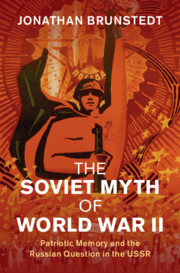 In this book, Jonathan begins with a simple question: How did a socialist society, ostensibly committed to Marxist ideals of internationalism and global class struggle, reconcile itself to notions of patriotism, homeland, Russian ethnocentrism, and the glorification of war? His answer is that this is a defining event for the Soviet epoch. This learned and stimulating monograph dives into the myth and remembrance of the USSR’s World War II victory by Soviet intellectuals and governing officials. The Soviet Myth demonstrates that while the experience and legacy of the conflict reinforced a sense of Russian primacy and Russian-dominated ethnic hierarchy, it simultaneously enabled an alternative, supra-ethnic source of belonging that would eventually subsume Russian and non-Russian loyalties alike to the Soviet whole. Dr. Brunstedt argues that the tension and competition between Russocentric and internationalist conceptions of victory burst open during the late 1980s. This schism reflected a wider struggle over the nature of patriotic identity in a multiethnic society that continues to reverberate in the post-Soviet space. Vladimir Putin’s recent calls for a Russian past that is ever more imperial and patriotic are a testament to this book’s timely contribution.
In this book, Jonathan begins with a simple question: How did a socialist society, ostensibly committed to Marxist ideals of internationalism and global class struggle, reconcile itself to notions of patriotism, homeland, Russian ethnocentrism, and the glorification of war? His answer is that this is a defining event for the Soviet epoch. This learned and stimulating monograph dives into the myth and remembrance of the USSR’s World War II victory by Soviet intellectuals and governing officials. The Soviet Myth demonstrates that while the experience and legacy of the conflict reinforced a sense of Russian primacy and Russian-dominated ethnic hierarchy, it simultaneously enabled an alternative, supra-ethnic source of belonging that would eventually subsume Russian and non-Russian loyalties alike to the Soviet whole. Dr. Brunstedt argues that the tension and competition between Russocentric and internationalist conceptions of victory burst open during the late 1980s. This schism reflected a wider struggle over the nature of patriotic identity in a multiethnic society that continues to reverberate in the post-Soviet space. Vladimir Putin’s recent calls for a Russian past that is ever more imperial and patriotic are a testament to this book’s timely contribution.Jonathan Brunstedt publishes, The Soviet Myth of World War II
Dr. Jonathan Brunstedt shares with the Department his just released monograph, The Soviet Myth of World War II: Patriotic Memory and the Russian Question in the USSR published by Cambridge University Press! The website is here… https://www.cambridge.org/us/academic/subjects/history/russian-and-east-european-history/soviet-myth-world-war-ii-patriotic-memory-and-russian-question-ussr?format=HB
